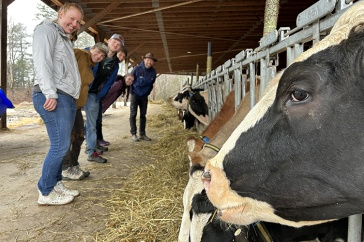
When I started working at UNH in October 2008, there were two high-profile topics I recall as taking up many staff writers’ time. One was the installment of a then brand-new President Mark Huddleston, who made history by livestreaming his inauguration — an idea at the time so novel it made the PR Newswire screen in New York’s Times Square. The other was the imminent launch of the university’s EcoLine project, a partnership with Rochester-based company Waste Management to capture landfill gas that would be piped to Durham to fuel the university’s cogeneration plant and power campus.
Almost a decade later, these two subjects are once again at the fore as we share the news of President Huddleston’s plans for retirement and take a deep dive into the university’s commitment to sustainability. In a future issue, we’ll look at the many milestones of President Huddleston’s tenure — when he steps down in June 2018, it will be as the longest-serving president in UNH history. For now, however, his commitment to reinforcing and expanding the university’s role as a leader in sustainable practices seems like a fitting place to start.
That 2008 inauguration set the tone: The idea behind a virtual installment, livestreamed from the MUB to homes and businesses around the world, was to allow guests to “attend” the festivities without having to travel to Durham. Nine months after that, some 20,000 guests were on hand for the university’s first sustainable commencement, powered by the official launch of the EcoLine, which today provides 85 percent of the university’s overall power (the remaining 15 percent comes from a local hydroelectric source).
At the time, President Huddleston deemed it “fitting” that UNH’s largest annual celebration embrace sustainability, as it was at the core of the academic and administrative practices and philosophies that drive the university all year round. Many of those practices and philosophies — and the programs through which they are manifest — are on display in this issue’s sustainability feature. It’s a daunting task to capture the full breadth of sustainability at UNH, and this issue’s feature is by no means exhaustive. Rather, we hope it can serve as a launching point for a much longer conversation about this important topic, which has such critical implications for life not just at this university but well beyond.

Kristin Waterfield Duisberg
Editor-in-chief
Originally published in UNH Magazine Fall 2017 Issue
-
Written By:
Kristin Waterfield Duisberg | Communications and Public Affairs
















































